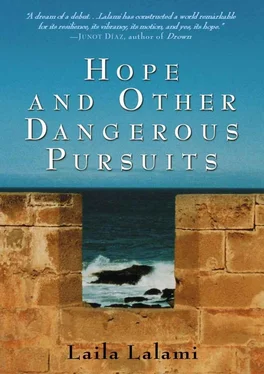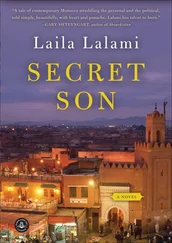“Leave the dishes,” he said. “You can do them later.” He pulled her away from the sink, his hand on her wrist, and took her back to the courtyard, where they sat down on the divan. His skin felt softer than hers, yet his fingers had left a mark on her wrist where he had pulled her. He leaned in and kissed her palm. I shouldn’t have doubted my mother, Halima thought. The powder is working.
THE NEXT DAY, Halima was waiting for the bus that would take her to the fish market at the Casablanca port, when she spotted a crisp fifty-dirham bill on the dusty sidewalk. What luck! That same morning, Maati had promised her he’d stop drinking and now this. When she got on the bus the attendant said he had an extra ticket that someone had bought by mistake and she could have it for ten rials. She smiled and put the ticket in her wallet. She found a seat by the window and looked at the outside world through the smudged glass. Buildings with peeling walls and satellite dishes flashed by, occasionally interrupted by palm trees.
At the market entrance, a one-eyed man in a dark brown jellaba sat on the ground, holding out his hand. He was so old that he could barely call out to passersby, his frail voice reaching only a few feet away. Halima looked through her wallet for some coins and gave them to him.
Along the lane, vendors in blue lab coats praised the freshness of their wares and their low prices. Halima stepped over the rivulets of fish scales and water that flowed between the stalls. Once a week she tried to break from the monotony of couscous, bean soups, and fritters that she could afford to feed the children by buying cheap fish. Ordinarily she would buy sardines or mackerel, but today she was in a mood to splurge, so after haggling with one of the vendors, she bought a large white fish for making a tagine.
While she worked on lunch, Halima found herself humming with Farid El-Atrache while he sang “Wayak” on the radio. She cleaned the fish over the sink, then cooked it in tomato and lemon sauce. The table was set, but Maati still wasn’t home. She stood in her kitchen, trying to decide what to do. If she served the tagine now, the food would be cold by the time he got home and he might be upset. If she waited, the children would be late for school and he might still be upset. She hated these impossible choices that he forced her to make every day. She watched the clock with increasing anxiety, but soon she heard the creaking of the front door and grabbed the tagine and brought it out.
Maati sat cross-legged on the low divan, rubbing his hands together at the lemony smell emanating from the funnel-shape pot. The children sat around the table, and Halima took her seat, completing the circle. Maati cut the best pieces of fish and put them on the children’s side of the communal dish. After getting a taste he said, “May God grant you health. This is excellent.”
“To your health,” she replied.
“The teacher said we need to buy a new history book,” Farid said.
“Again?” Halima replied.
“Last time it was a grammar book, Mama,” Farid said, rolling his eyes. Halima didn’t know much about grammar or history, having taken only literacy classes, but she didn’t like his tone.
“Tell her we’ll buy it next week,” Maati said. He tapped the boy’s head, leaving a sticky imprint of fish sauce on it. Just a month earlier, Mouna had been unable to go with the rest of her class on a field trip to the Roman ruins at Volubilis, near Meknès. Halima knew that, despite his good intentions, Maati would not keep his promise to their child.
After the children had gone back to school, Maati and Halima settled down for tea. He was quiet today, but she didn’t mind. She sat back on the divan, enjoying her drink. Maati finished his tea, then lay down to take a nap. “Aren’t you going back to work?” she asked.
His eyes shifted. “The boss fired me.”
Halima’s heart jumped in her chest. She sat up. “Why?” she asked, even though she already knew that it must have been because he’d been caught drinking. She felt sorry for him, but disgust overcame pity. “Did you think Si Hussein would just let it slide?” Maati wrapped his arm across his forehead, shielding his eyes from her stare. “What are we going to do?” she asked.
“I’ll find something else,” he said. His tone was confident, but he turned his face away from her.
Halima glared at her husband. Mimicking his voice, she groaned, “I’ll save money, I’ll buy my own cab, I’ll get us out of Zenata one day, you’ll see.” Maati took his arm off his eyes and looked at her. Halima stopped impersonating him. Still, she continued, “And all for what? We’ll be stuck here till the day we die. Soon we’ll be begging at the door of the mosque on Fridays.” She looked down at her tattered slippers. She was sliding her feet into them to get up, so she didn’t see his hand reach out — only felt it when it hit her face and knocked her to the side, the air suddenly out of her lungs. She jumped up to get away, but he kicked her so hard that his shoe flew over her head. She landed on her knees, her chin hitting the floor, her teeth shaking in her mouth. She threw his shoe back at him, pushed herself up on her hands, and ran out of his reach, locking herself up in the tiny water closet, as she usually did when they fought. She saw her face in the mirror. Maati’s hand hadn’t quite landed on her cheek, but there were clear imprints on the side of her neck and jaw. She gripped the side of the sink and let out a long, rasping cry.
She was still in the bathroom when Maati stormed out, slamming the door behind him. She waited for a while to make sure he was gone before coming out and getting a turtleneck to wear under her dress. Maati had already been giving her less and less for running the household. She spent her afternoons in her courtyard, bent on her marma, working on fancy scarves for socialites or bed sheets for brides. Now that Maati had lost his job she knew he’d turn to her for beer money. She let her head drop onto her knees. How did it get to this? Where was the man she’d married? He had been full of promise and energy and ambition, but now he was lazy and angry, ranting at the taxes that cut through his profits, at the customers who didn’t leave him tips, at the other drivers for not covering for him when he slipped out to drink.
She wiped her face with her hands, feeling for the welts that were already forming. Lifting her housedress, she looked for the scar from the last beating, when Maati had cut her calf with his belt buckle. Now that the cut had healed, it had the shape of lips, as though he had merely kissed her leg and left a mark. She scratched the skin around it and pulled her sock up.
HALIMA WAITED FOR the bus that would take her to the judge’s house in Anfa, a posh seaside neighborhood in Casablanca. Taking a new route made her anxious, and she stood rigidly at the stop, occasionally leaning forward to see if she could catch a glimpse of the bus making the turn onto Place Mohammed V. She wore a light green jellaba and her hair, cut short a few weeks earlier, fluttered in the breeze. She held on tightly to her purse. She’d never had that much money on her. Before leaving her mother’s house she had counted the money her brothers had sent when she’d told them she had started her divorce proceedings. She’d snapped each bill between her thumb and forefinger and put them in the envelope that was now tucked in the inner compartment of her handbag.
The smell of rubber and exhaust permeated the air. Near the bus stop a group of day workers squatted, cigarettes between their yellowed fingers, chatting under a cloud of blue smoke. A barber had just rolled up his metal curtain, and now he splashed water on the sidewalk in front of his shop in a futile attempt to get rid of the dust. Finally an old bus, its front bumper hanging loose, roared up in a billowing cloud of black smoke.
Читать дальше












